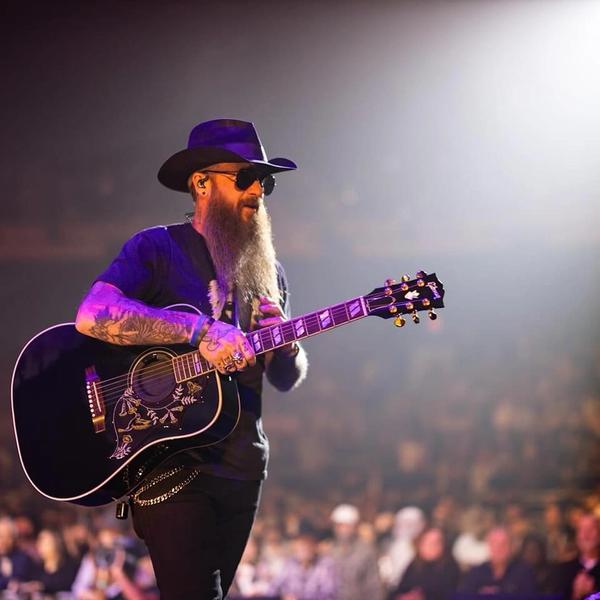




Link copied

By his telling, Cody Jinks has often done things his way.
Even before he became a renowned musical maverick within the industry, he was learning how to do it all by himself from a young age.
As a child, Jinks listened to other voices within the pews at church, learning to harmonize with them from a young age. From there, his dad showed him a few chords and Left Frizzell songs on the guitar. By the tender age of five, he had started writing and singing his own songs.
Despite letting his instrument collect dust as he focused on school and playing football through his adolescence, he picked it back up in his late teens as he became interested in the heavier sounds of Metallica and Pantera.
Although Jinks grew up on country music, he rebelled against what he knew by replacing three chords and the truth with thrash metal and a band. When his band Unchecked Aggression broke up in 2003, he took a year off before naturally returning to his western roots.
Over twenty years since he made the switch back, Jinks has regularly been classified as an 'Outlaw Country' artist. Despite the debate surrounding the label, Jinks has fulfilled the stereotypical meaning of what it means to be in the genre. Most simply put, an artist who fights for creative freedom with music characterized by a genre blend, with country instrumentation and introspective lyrics.
It's taken time for Jinks to craft his recognizable image with strategic and purposeful branding in country over the years - so to new fans, it could be hard to imagine he ever dabbled in heavier rock and metal. But there's an edge to his style of music influenced by his punk rock past. With his robust baritone drawl, roughened by cigarettes and screaming, tattoos stamped across his arms and a bad boy in an all-black dress code, there's just enough evidence of his hardcore era to remember.
Now well into a successful career in country, the upper-echelon Texan entertainer makes all the big decisions without a record deal – all while steering a tribe of 30 employees who help him drive through the industry without the roadblocks of any second party interference.
Jinks is not afraid to accelerate alongside the new era of country music either, drawing inspiration from up-and-coming country artists like Zach Bryan who are changing the course of the genre. And subsequently, teasing content he's been "sitting on for years and years" to soon make it onto streaming platforms and into our ears.
Holler sat down with Jinks to discuss the rapidly changing scene in country music, his newly released album Change The Game, pressures of being independent and immediate plans for new music, as well as his dream collaborations and more.
On Change The Game:
I think there's a little bit of something for everybody on this record. There's really catchy stuff and really, really rockin’ stuff; it’s a lot of fun. I usually tend to go towards sentimental, and my dad's favourite song on the record is a song called ‘The Working Man’, that I wrote with Brian Martin. We wrote that during the recording [of Change the Game], we went in and just laid it down because it was so strong. I think that one may be in contention as my absolute favourite right now.
On the title track:
I wrote that song with Josh Morningstar. When we finished that song, I was like, “I think that might be a title track”. We wanted to make it sound bold without sounding too cocky, but the fun part about being where we're at now is that we feel like we've changed the game thus far. What do you do now? That's the question. What do you want to do now? The answer I found was that I wanted to see what I could do individually. I am seeking counsel, I have a great staff, but [I’m] actually allowing my staff to think more outside of the box. We've found that it's working a great deal and I’m finding a new success at 43 years old, it's crazy.
On even more new releases:
I'm sitting on four records - two EPs, a Lefty Frizzell tribute record and an acoustic record. I have so many things to put out right now that it's going to take me until mid-2025 to get just what I have now out; I've been sitting on some of it for years and years. In the meantime, we’re still recording - we're going back into the studio in May. We're always recording, we're always releasing music.
On drawing inspiration from new artists such as Zach Bryan:
All I'm doing is really taking a page out of the Zach Bryan playbook. The thing about the music business is it's always changing very, very quickly, so you're always trying to stay on top of what's going on. I remember when Zack came out a few years ago, and he just started dumping all this rad content; he didn't care about whatever, he just put it out. That was a huge no-no up until a few years ago. At this point, put it out if it's there.
On the pressure of being independent:
When I took everything back over, it was overwhelming. Then I had this thought where I was worried about a bunch of things one day, and I was sitting there thinking to myself “none of this would be any different”. If you have a manager, your manager typically is just the person who helps you make decisions and cushions you from a lot of the harder stuff to look at, but it's all stuff that ultimately I have to make decisions about anyway.
So, I think I'd rather have the added stress and know every facet of the deal, or the show or whatever it may be - I think that outweighs the extra anxiety. I work a lot more hours when I'm at home and not on the road than I used to, you know, I'm probably 30 people. I have managers that have their group of people but, you know, I do Monday morning meetings like most people. I'm still learning for sure. I’ve got a lot more to learn.
On touring with Luke Combs:
We met him a couple of years ago - we played with him in Ohio; what a great dude and great camp. That's why we said yes to the shows because they were so great to us when we played with them the first time. I don't play with people I don't like to play with and that's because I don't have to. it's exciting to be up there with guys like that. You know, grateful to them for the opportunity.
On returning to the UK and Europe:
I had a conversation with my agent who has already talked to some people in Europe, I haven’t been anywhere in Europe in 12 years. So, I had mentioned that I was willing to consider going back to Europe in some time in 2025. If that is the case, then the UK will be on that - there it is folks, I promise.
On his dream collaboration:
Dead or alive? Can I do both? My dead would be Merle Haggard. My live one would be James Hetfield.





